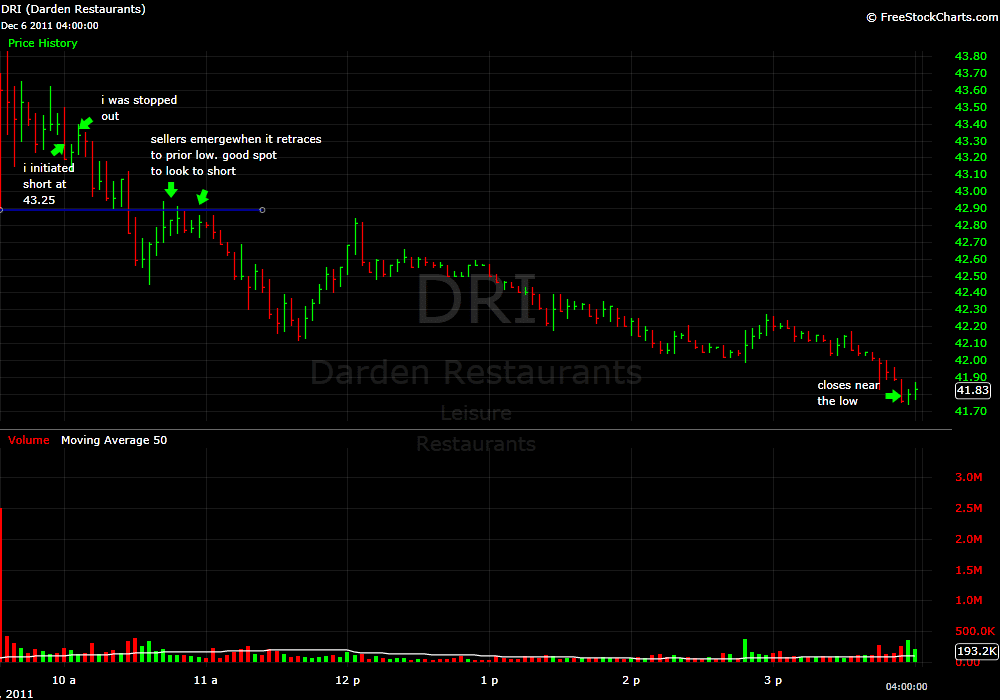I was watching DRI trade on the Open today. To say that the price action was “whippy” would be an understatement. It seemed to be touching every price and there was no way I could possibly control my risk. So I waited. After 10:00AM I initiated a short position at 43.25. I saw some selling a couple of minutes earlier at 43.50 but when I tried to get short at 43.45 the algos were fighting to get in front of me and I could not get a print. DRI dropped to 43.12 but then quickly spiked up to 43.40 and I was stopped out of my position.
I noticed that two traders on the desk were still short DRI after I had been stopped out. The trade started to work for them. By 10:30 it made a new low knocking out the opening range and pre-market support. It quickly spiked back up to pre-market support, which had become resistance. I asked one of the traders what he was doing with his position and he replied that he had covered and would look to re-short into a spike. Fast forward an hour later and he had never re-entered the position and missed the next point of downside.
One of the strongest psychological urges traders face is exiting positions that are working. This happens for a variety of reasons. If you close a position “while in the money” your ego gets some points for being “right”. Another cause of traders closing out positions where they are making money is the inevitable drawdown that occurs when stocks have their natural retracements. And the memories of these drawdowns seem to be much stronger than traders’ memories of their positions that continued to trend and work for them. The ability to hold winning positions and managing them in a way that maximizes your upside while adequately controlling risk is an art that can take many years to master.
Young traders will frequently ask me how they can learn to hold a profitable position for a longer period of time. The first and easiest step to take is to make sure that you hold a small piece of your position until you know for sure that the position is no longer working. If you have a 400 share short make sure you piece out of the position and hold that last 100 shares until the stock completely reverses its trend or becomes so over extended the risk/reward no longer makes any sense. Notice that by giving young traders two options for closing that final 100 shares I have opened the door for them to wuss out if they so choose.
Steven Spencer is the co-founder of SMB Capital and SMB Training and has traded professionally for over 15 years. His email is [email protected]
*live trades discussed in this post took place in T3 Trading Group, LLC a CBSX broker dealer
no current position in DRI



7 Comments on “The Risk of Closing a Position That is Working For You”
Great post. Def something every trader can improve on, which takes screen time. Covering too soon reminds me of my shorts on PCS back on August 2nd when it dropped off a cliff. Oh the missed opportunities…can’t cry over spilled milk tho 🙂 always opps to learn and grow
A timely post. The emotional discomfort of holding is so often for me overcome by the relief of a profit. A review of my past month’s trades shows just how big an effect this has on my account; I’d have been up a lot, but as it is I’m flat. It turns out my arms are long enough to spank myself!
Visualisation might be a way forward.
Thanks.
agree that selling (winners) is so much more difficult than entry points.
have a rule for getting out and then a rule for getting back in. 42.50 break at 1pm, risk .10
Definitely agree that the way to learn to hold trades longer is to get out of everything except a tiny position. As you get more and more comfortable, build the size of the portion you hold onto for a bigger move.
I’ve always found that while its not optimal from a maxium profit perspective scaling out allows you to release some of that internal trading conflict and tension we so oftern create. Once removed our ability to objectively asses the trade comes back (if we ever had it to begin with)
I keep re-reading this post as holding positions is my biggest focus at the moment. Thanks!